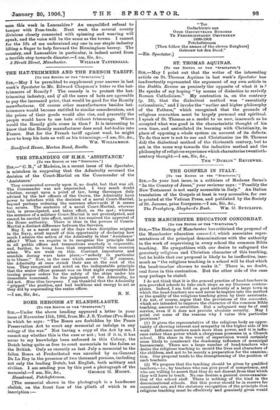THE MANCHESTER EDUCATION CONCORDAT.
[To THE EDITOR OF THE .SPEOTET011:1 SIR,—The Bishop of Manchester has criticised the proposal of the Manchester education concordat, which associates repre- sentatives of the principal denominations with the authoriq in the work of supervising in every school the common Bible teaching. He sympathises with our desire to safeguard the genuinely religious and Christian character of this teaching, but he holds that our proposal is likely to be ineffective, inas- much as "the religious teaching in a school will be that which the head-teacher chooses to make it." There is, no doubt, real force in this contention. But the other side of the case may perhaps be stated.
I do not think that it is the general practice of head-teachers in non-provided schools to take such steps as my Diocesan contem- plates. Indeed, I am told on good authority of a large town in which the head-teachers are said never to inquire into the method or the quality of the religious teaching given by their assistants. I do not, of course, argue that the provisions of the concordat. Which are intended to improve the character of the common Bible teaching, amount to securities. But a safeguard may be of real service, even if it does not provide absolute security. May I point out some of the reasons why I value this particular provision?
(1) It gives the representative of the religious body an oppor- tunity of showing interest and sympathy in the higher side of his work. Influence matters much more than power, and it is influ- ence rather than power which a clergyman possesses in a Church school. His share in the work of supervision would certainly seem likely to counteract the deadening influence of municipal bureaucracy. There are a large number of head-teachers who desire the religious teaching to mould the lives and characters of the children, and not to be merely a preparation for the examina- tion. Our proposal tends to the strengthening of the position of such teachers.
(2) We propose that the teaching should be given by qualified teachers,—i.e., by teachers who can give proof of competency, and who are willing to assert that they do not dissent from that which they will have to teach. No one desires a general cross-examina- tion of the school staff. There is nothing of the kind in the denominational schools. But this power should be in reserve for occasional use, and the statutory recognition of the principle that religious teaching must be effectively and genuinely given would both raise the standard of the teaching, and strengthen the hands of the denominational representatives.
(3) It is a very strong feature of the concordat that it recognises ; that principle of Church authority on which the Bishop has so earnestly and so convincingly insisted. All the religious teaching would be given under the supervision and with the approval of ' the representatives of the denominations. Behind the protest of the individual representative would be his right to advise the withdrawal of his children for separate teaching. In other words, the common teaching would not be, properly speaking, undenomi- national.
(4) The representation of the principal religious bodies on the Visiting Committee in every school is a recognition of the religious basis of education. Every school in England becomes to that extent a religious institution.
The Manchester concordat embodies the only scheme which has received the approval both of Churchmen and Nonconformists, and is based on the view that it is only by their co-operation that the Christian character of our school system can be maintained. If once the right of withdrawal for separate teaching is conceded, the difficulties which would sometimes arise would not be of the kind which exasperate. The common interests of the Christian bodies are not much discussed, but are of enormous strength. If a clergyman felt it to be his duty to withdraw his children altogether from the common teaching, he could continue to co- operate with his Nonconformist colleagues for the good of the
• school. All Church children would, of course, receive some • separate teaching.



































 Previous page
Previous page